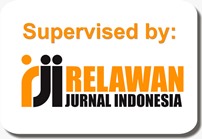THE INFLUENCE OF ENTREPRENEURIAL ORIENTATION ON DIGITAL MARKETING AND SUSTAINABLE COMPETITIVE ADVANTAGE
Abstract
This research aims to determine the influence of entrepreneurial orientation on digital marketing and sustainable competitive advantage. The sample used in this research was 314 restaurants in Malang City with a stratified random sampling technique and the method used was proportionate random sampling. This research uses path analysis with smartPLS to find out how much influence entrepreneurial orientation with six indicators (innovativeness, risk-attitude, proactiveness, autonomy, aggressiveness, competitiveness) has on digital marketing as measured by 4C (co-creation, currency, communal activation, conversation) and sustainable competitive advantage as measured by indicators (scarce corporate value, imitability, durability, transferability). In this research, entrepreneurial orientation can encourage an increase in sustainable competitive advantage in a number of restaurants in Malang City. Entrepreneurial orientation can encourage increased digital marketing for restaurant businesses in Malang City. Entrepreneurial orientation is a creative and innovative ability that is used as the basis and resource for seeking opportunities for success. Furthermore, entrepreneurship not only requires knowledge but also skills. Entrepreneurial competence is needed in implementing marketing strategies in order to obtain a solid competitive advantage through the value of responsiveness to customer needs
Keywords: Entrepreneurship Orientation, Digital Marketing, Sustainable Competitive Advantage
Full Text:
PDFReferences
Alabdullah, T. T. Y., & Kanaan-Jebna, A. (2023). The Mediating Role of Innovation on the Relationship between Supply Chain Management and Company Performance in the Kingdom of Bahrain. JOURNAL OF HUMANITIES, SOCIAL SCIENCES AND BUSINESS, 3(1), 160–176. https://doi.org/10.55047/jhssb.v3i1.845
Barney, J. (1991). Firm resources and sustained competitive advantage. Journal of Management, 17(1), 99–120.
Grant, R. M. (1991). The resource-based theory of competitive advantage: implications for strategy formulation. California Management Review, 33(3), 114–135.
Hair Junior, J. F., Hult, G. T. M., Ringle, C. M., & Sarstedt, M. (2017). A primer on partial least squares structural equation modeling (PLS-SEM). Los Angeles: Sage.
Indrawan, R., & Yaniawati, R. P. (2014). Metodologi penelitian: Kuantitatif, kualitatif dan campuran untuk manajemen, pembangunan, dan pendidikan.
Kotler, P., & Keller, K. L. (2017). Marketing Management. Pearson.
Lumpkin, G. T., & Dess, G. G. (2001). Linking two dimensions of entrepreneurial orientation to firm performance: The moderating role of environment and industry life cycle. Journal of Business Venturing, 16(5), 429–451.
Mason, M. C., Floreani, J., Miani, S., Beltrame, F., & Cappelletto, R. (2015). Understanding the impact of entrepreneurial orientation on SMEs’ performance. The role of the financing structure. Procedia Economics and Finance, 23, 1649–1661.
Muhyi, H. A. (2012). Pengaruh keterampilan berwirausaha terhadap pertumbuhan usaha berkelanjutan pada industri kecil di kota sukabumi. Indonesian Journal of Dialectics, 2(3), 242588.
Mulyadi. (2011). Kewirausahaan: Bertindak Kreatif dan Inovatif. Rafah Press.
Purba, M. I., Simanjuntak, D. C. Y., Malau, Y. N., Sholihat, W., & Ahmadi, E. A. (2022). The effect of digital marketing and e-commerce on financial performance and business sustainability of MSMEs during COVID-19 pandemic in Indonesia. International Journal of Data and Network Science, 5(3), 275–282. https://doi.org/10.5267/j.ijdns.2021.6.006
Sarwono, J. (2006). Metode penelitian kuantitatif dan kualitatif.
Wati, A., Indrawati, A., Martha, J., & NA, F. (2020). Digital Marketing. Adulitera.
Yacoub, G., Mitra, P., Ratinho, T., & Fatalot, F. (2022). Sustainable entrepreneurs: what drives them to engage in different crowdfunding types? International Journal of Entrepreneurial Behavior & Research, 28(4), 980–1000.
DOI: https://doi.org/10.31846/jae.v12i3.830
Refbacks
- There are currently no refbacks.

This work is licensed under a Creative Commons Attribution-NonCommercial-NoDerivatives 4.0 International License.
e-Jurnal Apresiasi Ekonnomi Indexed by:












